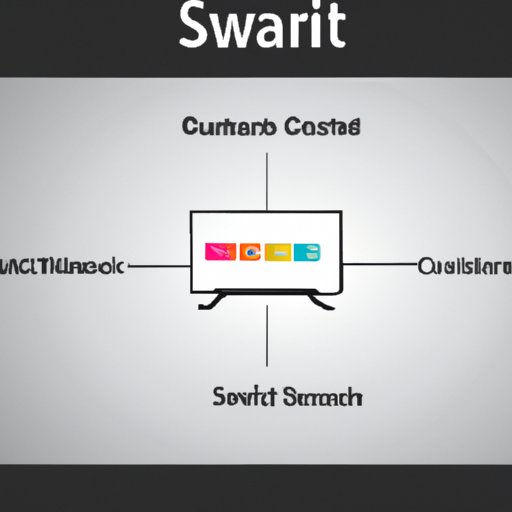Introduction
Smart TVs are the latest innovation in home entertainment technology. They offer a unique combination of internet connectivity, advanced features, and access to streaming services that make it easy to enjoy all your favorite content. But what exactly is a Smart TV and how does it work? This article explores the basics of Smart TV technology, compares different brands and models, discusses the pros and cons of ownership, and looks at the future of Smart TV technology.

Exploring the Basics of Smart TV Technology
A Smart TV is a television set that has built-in internet connectivity and access to streaming services such as Netflix, Hulu, and Amazon Prime Video. These TVs come with a variety of features that allow you to browse the web, play games, watch videos, and more. Smart TVs also have integrated voice assistants, such as Alexa and Google Assistant, which allow you to control the TV and other connected devices with just your voice.
Understanding the Connectivity and Features of Smart TVs
Smart TVs can be connected to the internet either via Wi-Fi or Ethernet cable. Once connected, users can access a variety of features and applications, such as streaming services, social media, games, and more. Smart TVs also come with a range of additional features, such as voice control, motion control, and gesture control, which allow users to interact with the TV in new and innovative ways.
Comparing Different Smart TV Brands and Models
When it comes to choosing a Smart TV, there are a variety of options available. Different brands and models offer different features, so it’s important to do your research before making a purchase. Popular Smart TV brands include Samsung, LG, Sony, and Vizio. It’s also important to consider the size and resolution of the TV when making a purchase, as these factors will affect the overall viewing experience.

Analyzing the Pros and Cons of Smart TV Usage
Owning a Smart TV brings a number of advantages, such as access to streaming services, internet browsing, and voice control. Smart TVs are also relatively affordable, making them a great choice for budget-conscious shoppers. However, there are some drawbacks to owning a Smart TV, such as the need to constantly update software and the potential for security issues.
Investigating How Smart TVs Can Stream Content
One of the main advantages of owning a Smart TV is the ability to stream content from popular services such as Netflix, Hulu, and Amazon Prime Video. Setting up streaming services on a Smart TV is relatively straightforward, but there are a few things to keep in mind. For example, make sure that you have a reliable internet connection and that your Smart TV is compatible with the streaming service you want to use. Additionally, some streaming services require a subscription fee, so make sure to check the cost before signing up.

Exploring the Future of Smart TV Technology
Smart TV technology is constantly evolving, and new trends are emerging all the time. In the near future, it’s likely that Smart TVs will become even more powerful and feature-rich, with improved voice control, better integration with other connected devices, and enhanced streaming capabilities. Additionally, as 5G networks become more widespread, it’s likely that Smart TVs will become even faster and more reliable than they are today.
Conclusion
Smart TVs are an exciting development in home entertainment technology. They offer access to streaming services, advanced features, and internet connectivity, all of which make it easier to enjoy your favorite content. When choosing a Smart TV, it’s important to consider the features and price, as well as the setup process for streaming services. As Smart TV technology continues to evolve, it’s likely that Smart TVs will become even more powerful and feature-rich in the future.


